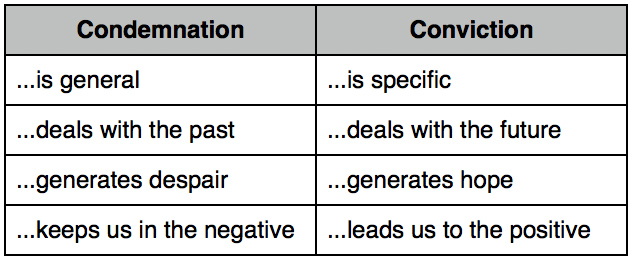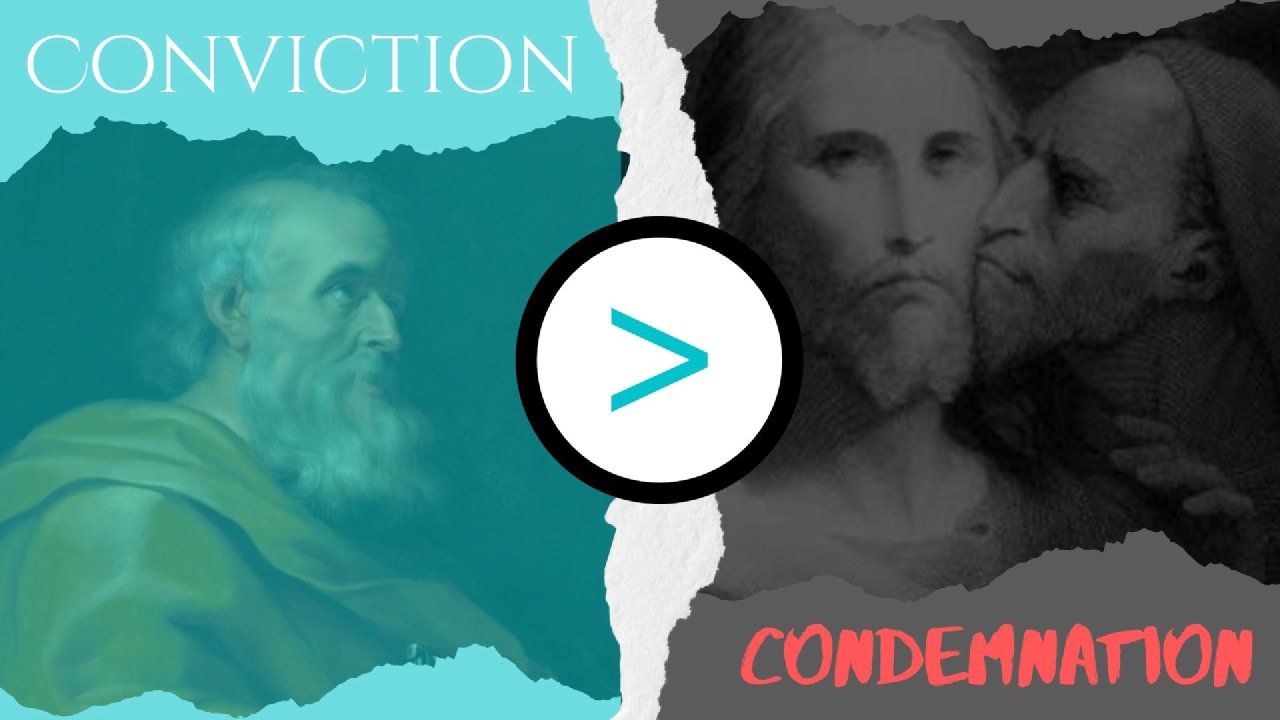I know very few people who like being called out when they make a mistake, at the least, I know I’m not fond of it, and yet as much as I’d rather people just pointed out all the wonderful things I do, I question if any of us can truly grow if we are never confronted with the things that we could do better.
From what I can see there are two common reactions to having a potential failing pointed out, conviction and condemnation.
Conviction
The word “conviction” in Greek is elegchō. It reveals something to be wrong. Conviction doesn’t carry the judgmental aspect.
- The act or process of finding someone guilty of a crime, especially in a court of law. It is the formal declaration that someone has committed an offense.
- A firmly held belief, opinion, or principle. Synonyms include view, belief, and persuasion.
- Conviction comes from the Holy Spirit and brings awareness of a specific sin. Its purpose is to lead to repentance, forgiveness, and restoration.

Condemnation
The Greek word for “condemnation” is katakrima. It articulates a negative judgment declaration. Damnation is the last thing you want the judge to declare.
- The expression of very strong disapproval or censure. It carries a heavy moral blame.
- The act of condemning someone to punishment or sentencing them for an offense.
- Condemnation comes from the enemy, Satan. It brings feelings of general failure, fear, hopelessness, and shame that lead away from God.
Difference between conviction vs condemnation
Conviction
- Comes from the Holy Spirit, brings awareness of specific sin
- The purpose is to lead to repentance, forgiveness, and restoration
- Gives hope for transformation through Christ
Condemnation
- Comes from the enemy, Satan brings general feelings of failure and shame
- Leads away from God, to despair and stuckness
- Makes one feel unforgiven and hopeless

Example of Conviction
John felt convicted about yelling harshly at his son the other day. He recalled the specific words he had said in anger – “You are so lazy and irresponsible!”.The conviction made John aware of his specific sin and shortcomings as a father. He felt grieved that he had failed to model patience and speak with care. John realized he needed to seek forgiveness from both God and his son. John prayed and asked God to help him control his temper going forward. He then went to his son, apologized for losing his patience, asked for forgiveness, and had a meaningful conversation about improving their relationship.
The Purpose of Conviction
- Awareness of Sin: Conviction brings to light our sinful nature and reveals areas in our lives that fall short of God’s standards. It helps us recognize sin for what it truly is—an offense against God. Conviction is an invitation to humbly acknowledge our shortcomings and recognize our need for repentance and God’s forgiveness.
- Guidance towards Repentance: Conviction catalyzes personal growth and spiritual maturity. It leads us to repentance, realizing our need to turn away from sinful behaviors and attitudes and turn toward God’s righteousness. It is an opportunity for reconciliation with Him and a fresh start in our spiritual journey.
Example of Condemnation
After yelling at his son, John felt overwhelmed with general feelings of failure, shame, and hopelessness. He thought “I am a terrible father and always mess up” and “My son probably hates me now”.John ruminated over all his past failures. He felt too ashamed and stuck to approach God or his son. John started avoiding his son out of guilt and doubted he could ever change or be forgiven. The condemnation only increased John’s despair about the relationship. If ongoing, it would push John further from God and make restoration less likely.
Identifying Condemnation
- False Accusations: Condemnation bombards us with relentless accusations, reminding us of our past sins, failures, and shortcomings. It seeks to distort our perception of God’s character, making us doubt His forgiveness and love.
- Hopelessness: Condemnation leaves us feeling hopeless, unable to see a way forward or believe in God’s mercy. It keeps us trapped in guilt and shame, making us feel unworthy of God’s grace and incapable of experiencing His transforming power. Condemnation hinders our spiritual growth and prevents us from living in the freedom that Christ has granted us.

In summary, conviction brought a specific awareness of wrongdoing and led John to correct the issue through confession, forgiveness, and reconciliation. Condemnation brought only a general sense of failure leading to avoidance and hopelessness rather than restoration.

